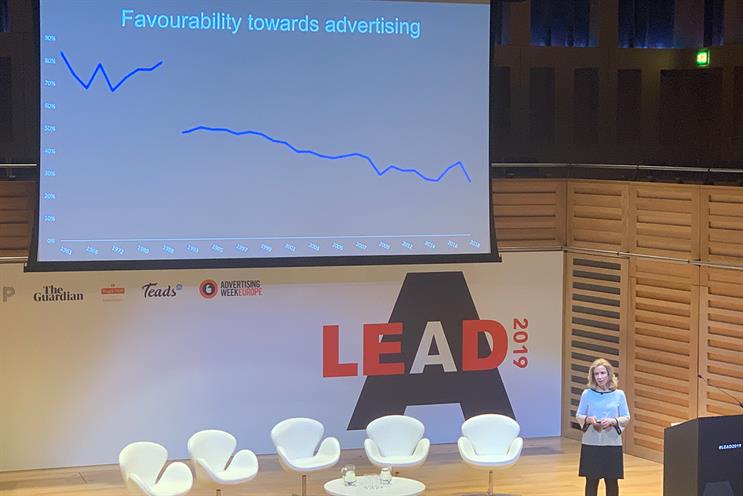
Britons still appreciate the benefits of advertising but are increasingly unhappy about the "bombardment" and "intrusiveness" of ads, the Advertising Association’s think tank, Credos, has found.
Public favourability towards advertising hit a record low of 25% in December 2018, according to Credos, which has previously found trust in advertising is "in long-term decline".
Favourability has almost halved since 48% in 1992, the earliest point for which like-for-like data exists, but it has dropped even further from the 1960s, 1970s and 1980s.
Karen Fraser, the director of Credos, unveiled the research at the AA’s Lead 2019 conference, where Stephen Woodfood, chief executive of the AA, introduced it as the trade body’s "biggest-ever study of public trust in advertising".
Credos, which surveyed 2,000 people, identified three main viewpoints about advertising that it described as "good", "bad" and troubling.
The good
"Advertising is valued as a source of information on new products and services, as well as being a form of entertainment," Credos said. "Some respondents also saw it can be a force for social good, providing important public-health information and representing progressive social values."
Less than a third of people in the study felt "actively unfavourable" towards advertising.
The bad
"Many respondents described feeling 'bombarded' by advertising," Credos said.
There were four main concerns: volume (the amount of advertising people witness), repetition (too-frequent exposure to the same creative), obtrusiveness (ads that are felt to unfairly delay or disrupt the user experience) and irrelevance (extending beyond the product being advertised to the execution of the ad and how it fits in with the surrounding environment).
Significantly, the research found bombardment was an issue across the media – in both online and traditional media channels. "No one channel is immune to these comments," Fraser said.
"Aspects of the creative execution of individual campaigns also bothered participants, with many citing irritating jingles and poor humour," Credos found.
The troubling
"Intrusiveness", "suspicious" or "manipulative" advertising techniques and targeting of "vulnerable groups" were all cited as troubling concerns by consumers.
Credos described intrusiveness as where "advertising is present in what are considered private places, such as letterboxes or email inboxes, or when individually targeted advertising appears to be based on personal data" – what Fraser called "creepy advertisements that follow you around".
Examples of ads that can cause suspicion or are felt to be manipulative included "claims that are felt to be misleading or too good to be true", "when terms and conditions are judged to hide important information", "when it is unclear to the viewer whether something is an advertisement" and "when creative work portrays unrealistic body image ideals".
Some of those surveyed also raised concerns about advertising that targets "sensitive sectors" and "vulnerable groups", such as the "financially secure", "those with addictions", children and the elderly.
Keith Weed, president of AA and outgoing chief marketing and communications officer at Unilever, said the research was a warning to the ad industry and it must "do our utmost" collectively to respond to the "concerns" and "be seen to do so".
Fraser said: "The best advertisers have always known [these findings], such as retaining respect and regard for those on the receiving end of your advertising, and a total commitment to honest and open communication with all parties involved in the production of advertising."
Mark Evans, marketing director of Direct Line Group, who spoke on a later panel, urged the ad industry needs to work collaboratively, warning there was a risk to all companies. "A falling tide sinks all boats," he said.
Lindsey Clay, chief executive of Thinkbox, called for more funding for the Advertising Standards Authority, the industry’s self-funded regulator, to help to raise standards – a suggestion that won a lot of support in a show of hands when the audience was asked their view.
Paul Bainsfair, director-general of the IPA, and Phil Smith, director-general of ISBA, promised to step up efforts to work together and said they were "committed to action" in response to the research.




.jpg)
.jpeg)
